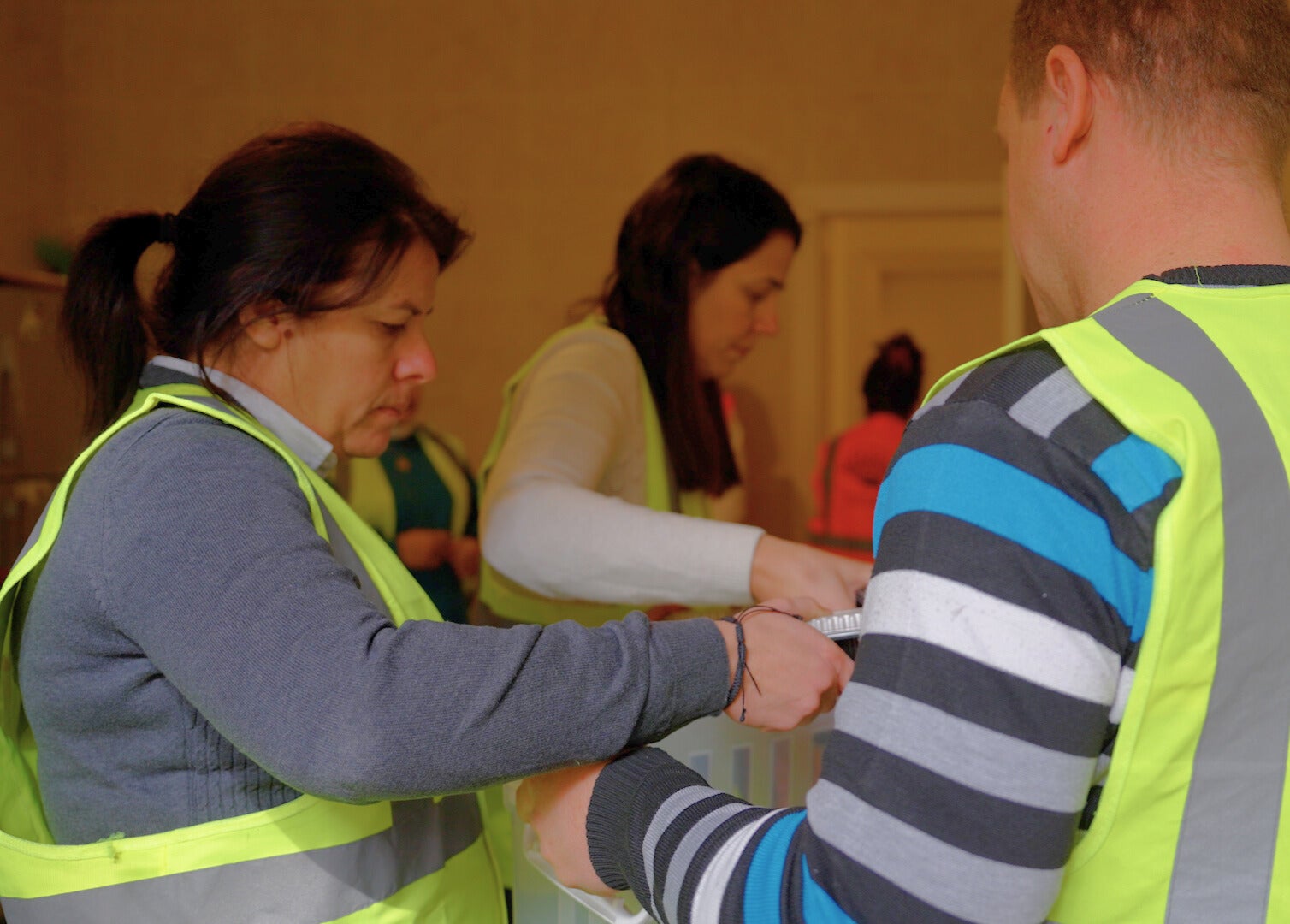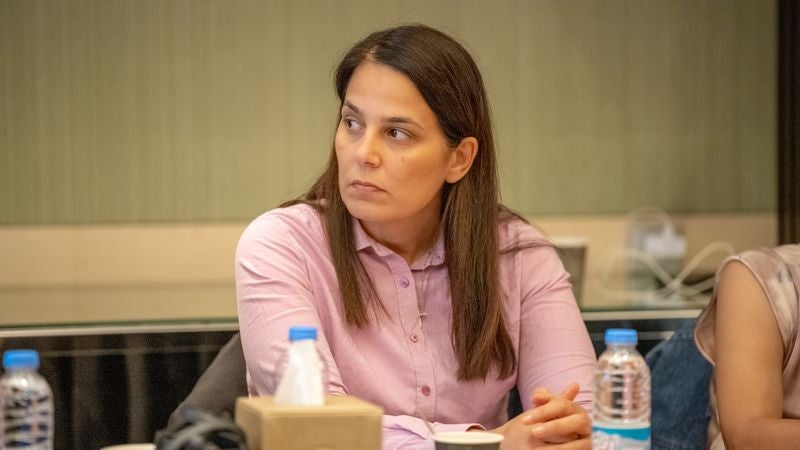One woman’s journey from peacebuilding to humanitarian action in Lebanon
Date:
During the recent Lebanon conflict (before a ceasefire took effect on November 27, 2024), countless women have stepped forward as pillars of strength and hope, navigating the challenges with leadership and compassion. From providing food and shelter to displaced families to mediating conflicts within affected communities, these women have taken on critical support roles.
Among them is Daad Azzi. Raised in Ain El Asad, Barja, a small village in the Shouf District, she obtained a PhD in criminal justice and founded the Al-Shouf for Development Association with a group of youth volunteers following the devastating Beirut Port explosion in 2020.[1]
Although the association’s initial mandate was to address community needs through a health centre and psychological support services, Azzi has since shifted the emphasis towards meeting the overwhelming humanitarian needs of displaced individuals who have sought refuge in her region, as of end of September 2024.

“The suffering of people breaks my heart,” she shares. “You cannot stand watching without supporting those in need.”
With limited resources and amid escalating violence, Azzi and her team worked tirelessly in 11 displaced centres stretching from Joun to Khalde, providing essential aid and services, ranging from health services and psychological support to distributing kits for women with hygiene products and clothing, ensuring that their most basic needs are met amid the crisis, reaching a total of 8,000 women, including 3,000 residing outside shelters.
Azzi is one of the 130 women peacebuilders supported since 2023 by UN Women’s “Women, Peace and Security in the Arab States” (Women Peace and Security) programme, implemented through International Alert with funding from the Government of Finland.[2] She uses the skills she has acquired in mediation and resolving disputes among displaced families and local communities in her region, which have been impacted by sectarian and social tensions. She fosters dialogue, often drawing on religious and cultural commonalities to bridge divides. “Even when it feels impossible, showing empathy and offering understanding can transform hostility into cooperation,” she explains.
Tensions arose one day when a woman from the hosting community became upset, feeling that the displaced individuals were being prioritized at the health center. Frustrated, she stormed out in anger. Azzi followed her, embracing her and pointing out that, unlike herself, the displaced women had no home to return to.
“Through this simple gesture of empathy and understanding, I hoped to bridge the divide and instill compassion in her,” Azzi reflects. “I believe it was a moment that made a lasting impact.”
“The training provided under the project equipped Daad Azzi with the tools she needed to navigate highly sensitive conflicts,” explains Maria Geagea, Project Manager for International Alert. “Her ability to transform anger into cooperation is proof of the practical effectiveness of these approaches in real-world scenarios. In displaced centres, where tensions often run high, she applied these techniques to foster dialogue and build trust among individuals from diverse and divided backgrounds.”
A people-centred approach
Azzi’s approach to peacebuilding and humanitarian work is deeply rooted in her personal experiences. Growing up in a rural village, she witnessed the struggles of women in her family and community, who endured domestic violence – which profoundly shaped her sense of justice, empathy, and compassion.
Her approach involves empowering displaced individuals by including them in the humanitarian efforts she leads. Recognizing the potential within these communities, she actively recruited volunteers and professionals from among the displaced.
“We had displaced volunteers from different experiences working with us,” she shares, highlighting how this supported relief operations while fostering a sense of purpose and belonging. Azzi also prioritized hiring displaced doctors to provide medical care. This approach addressed urgent health care needs and created an environment where displaced individuals felt safer and more at ease when receiving care from doctors from their own community.
By giving the displaced an active role in helping others, she turned a narrative of helplessness into one of empowerment and active contribution, strengthening the community’s resilience.

According to one displaced volunteer: “[She] didn’t just see us as victims; she saw us as individuals who could make a difference. Through her guidance, I found ways to contribute meaningfully to our community, whether by helping distribute aid or supporting others in need. [Her] leadership reminded us that, even in the most difficult moments, we still had the ability to make a change.”
Despite Azzi’s unwavering dedication, one of the most heart-wrenching challenges she faced is the inability to meet every request for help. The prolonged nature of the conflict has amplified this burden, leaving her grappling with feelings of helplessness and guilt, particularly towards her team, who tirelessly carry out their work under immense strain.
Azzi’s work exemplifies the critical role of women peacebuilders in navigating the nexus between development, humanitarian and peace efforts. Their role is indispensable in her association, where women make up 80 percent of the team.
Azzi credits UN Women’s WPS programme, which focuses on ensuring women’s protection and enhancing women’s role in conflict prevention, as a critical ally in their work.
“The programme was like a lifeline,” she remarks. “It reinforced the importance of staying impartial and focusing on the greater good. … Women can bring calm where tensions run high.”
According to Gielan Elmessiri, Country Representative, UN Women Lebanon, Azzi’s efforts highlight the transformative power of women’s leadership in crisis situations: “Her work showcases the vital role women play in bridging the gap between peacebuilding and emergency response. Through her work, she has shown that empowering women as mediators and humanitarian actors lays the groundwork for long-term stability within communities.”
[1] The Beirut port explosion killed 218 people. It wounded 7,000 people, of whom at least 150 acquired a physical disability; caused untold psychological harm; and damaged 77,000 apartments, displacing over 300,000 people.
[2] During the previous phase of the "Women, Peace and Security in the Arab States" programme (2019–2022), a total of 240 women received training.